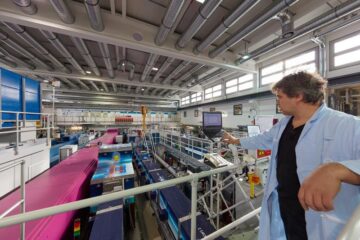h2i’s man-machine interface technology on show at CEBIT

h2i of France, a specialist in interactive equipment, will present its latest applications at the CEBIT trade fair in Hanover (Hall 9, Stand C09). h2i offers a patented disruptive technology that has the capacity to transform any equipment surface into an interactive control panel. h2i is primarily targeting the household-goods market, in which the goals of equipment manufacturers – well-being and comfort in everyday life – have resulted in high demand for increasingly intuitive and ergonomic interactive MMIs (man-machine interfaces).
Over the past 30 years, MMIs have progressed towards a greater degree of user comfort, alleviating design limitations and offering increased interactivity. In the last five years, new intangible MMIs have been developed. These more sophisticated MMIs offer unsurpassed levels of interactivity and styling design.
Of the current intangible MMI providers, only h2i meets the requirements of the household-goods market in terms of both the maturity of the solutions offered and their cost. Several of the world’s major equipment manufacturers have already chosen h2i technology for their latest product ranges because of the company’s new designs and innovations. In line with an economic model suited to the market and approved by major players in the MMI sector, h2i sells solutions directly to product manufacturers, either through licensing agreements or as an OEM.
Media Contact
Weitere Informationen:
http://www.infotechfrance.com/london/Alle Nachrichten aus der Kategorie: CeBIT 2006
Neueste Beiträge

Bakterien für klimaneutrale Chemikalien der Zukunft
Forschende an der ETH Zürich haben Bakterien im Labor so herangezüchtet, dass sie Methanol effizient verwerten können. Jetzt lässt sich der Stoffwechsel dieser Bakterien anzapfen, um wertvolle Produkte herzustellen, die…

Batterien: Heute die Materialien von morgen modellieren
Welche Faktoren bestimmen, wie schnell sich eine Batterie laden lässt? Dieser und weiteren Fragen gehen Forschende am Karlsruher Institut für Technologie (KIT) mit computergestützten Simulationen nach. Mikrostrukturmodelle tragen dazu bei,…

Porosität von Sedimentgestein mit Neutronen untersucht
Forschung am FRM II zu geologischen Lagerstätten. Dauerhafte unterirdische Lagerung von CO2 Poren so klein wie Bakterien Porenmessung mit Neutronen auf den Nanometer genau Ob Sedimentgesteine fossile Kohlenwasserstoffe speichern können…


















